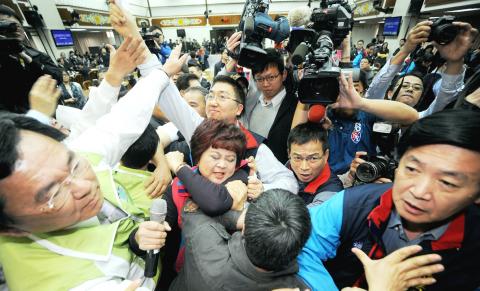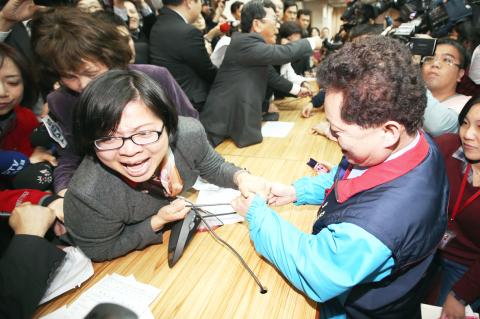The second day of a legislative meeting scheduled to review the cross-strait service trade pact was marked with clashes and condemnations between lawmakers of the two political camps.
“There may be differences in opinion between different parties, but these differences should be resolved through negotiation, not violence,” Chinese Nationalist Party (KMT) caucus whip Lin Hung-chih (林鴻池) told a press conference yesterday. “We condemn the Democratic Progressive Party [DPP] caucus for using violence against our caucus office director Chiang Kui-fang [江桂芳].”
Lin was referring to a scuffle which occurred in the afternoon, when DPP Legislator Chiu Yi-ying (邱議瑩) attempted to unplug a loudspeaker box belonging to the KMT caucus, as KMT lawmakers were speaking through loudspeakers, trying to interrupt the meeting.

Photo: Liu Hsin-de, Taipei Times
“I did not use violence against Chiang, I was trying to stop the KMT from interrupting the meeting. Chiang wanted to stop me from what I was doing, and I had to defend myself,” Chiu said.
As the tussle between Chiu and Chiang ensued, legislators from both camps rushed over, adding to more pushing and shoving.
Amid the chaos, KMT Legislator Alicia Wang (王育敏) collapsed and was rushed to the health center.

Photo: CNA
She was later diagnosed with several bone fractures in her arms and feet.
The conflict erupted as soon as DPP Legislator Chen Chi-mai (陳其邁), who presided over the meeting, announced the beginning the meeting at 9am.
About one minute before the official start, Lin and KMT legislators delivered a petition, asking that the meeting to reject the official record of Wednesday’s review of the service trade pact, saying that there should not be a meeting transcript since nothing happened during the meeting.
Chen refused to take the petition, saying the meeting had not started. However, after announcing the beginning of the meeting, he confirmed there were no issues with the transcript of the previous day, despite the verbal and written protest from KMT lawmakers.
As the meeting degenerated into chaos, Chen announced that the meeting would go into recess, and left the podium.
When Legislative Yuan staffers stepped down from the podium with Chen, several KMT legislators — notably Alex Fai (費鴻泰) — ran after them, trying to stop them from leaving, and accused them of not being neutral.
DPP legislators Chen Ting-fei (陳亭妃) and Lee Chun-yi (李俊俋) quickly moved to push Fai away, asking him “not to give staffers trouble.”
The meeting was again paused after the conflict between Chiu and Chiang, with Chen and his DPP colleagues again leaving the meeting room.
As Chen and DPP lawmakers did not return at the scheduled ending of the meeting at 5:30pm, KMT lawmakers declared the meeting adjourned, and said the caucus will hold meetings to review the services trade pact next week, when KMT Legislator Chang Ching-chung (張慶忠) is to serve as the rotating president of the Internal Administration Committee.
Meanwhile, the DPP caucus accused the KMT of resorting to lies and violence to block the review procedure.
Chen Chi-mai said the KMT caucus has been doing everything it could, including kicking Legislative Yuan staffers and blaming them for violation of neutrality and stealing away the registration form so that lawmakers could not speak in order, to compromise the meeting.
He also rejected the KMT’s claim that he failed to follow regulations and ignored Lin Hung-chih’s motion to reaffirm the proceedings.
“I was ready to accept [Lin’s] proposal, but he seemed to have a change of heart and hesitated. The next thing I knew, the scuffle between lawmakers began and he was never able to propose it again,” Chen Chi-mai said.
Additional reporting by Chris Wang

Chinese Nationalist Party (KMT) Chairman Eric Chu (朱立倫), spokeswoman Yang Chih-yu (楊智伃) and Legislator Hsieh Lung-chieh (謝龍介) would be summoned by police for questioning for leading an illegal assembly on Thursday evening last week, Minister of the Interior Liu Shyh-fang (劉世芳) said today. The three KMT officials led an assembly outside the Taipei City Prosecutors’ Office, a restricted area where public assembly is not allowed, protesting the questioning of several KMT staff and searches of KMT headquarters and offices in a recall petition forgery case. Chu, Yang and Hsieh are all suspected of contravening the Assembly and Parade Act (集會遊行法) by holding

PRAISE: Japanese visitor Takashi Kubota said the Taiwanese temple architecture images showcased in the AI Art Gallery were the most impressive displays he saw Taiwan does not have an official pavilion at the World Expo in Osaka, Japan, because of its diplomatic predicament, but the government-backed Tech World pavilion is drawing interest with its unique recreations of works by Taiwanese artists. The pavilion features an artificial intelligence (AI)-based art gallery showcasing works of famous Taiwanese artists from the Japanese colonial period using innovative technologies. Among its main simulated displays are Eastern gouache paintings by Chen Chin (陳進), Lin Yu-shan (林玉山) and Kuo Hsueh-hu (郭雪湖), who were the three young Taiwanese painters selected for the East Asian Painting exhibition in 1927. Gouache is a water-based

Taiwan would welcome the return of Honduras as a diplomatic ally if its next president decides to make such a move, Minister of Foreign Affairs Lin Chia-lung (林佳龍) said yesterday. “Of course, we would welcome Honduras if they want to restore diplomatic ties with Taiwan after their elections,” Lin said at a meeting of the legislature’s Foreign Affairs and National Defense Committee, when asked to comment on statements made by two of the three Honduran presidential candidates during the presidential campaign in the Central American country. Taiwan is paying close attention to the region as a whole in the wake of a

OFF-TARGET: More than 30,000 participants were expected to take part in the Games next month, but only 6,550 foreign and 19,400 Taiwanese athletes have registered Taipei city councilors yesterday blasted the organizers of next month’s World Masters Games over sudden timetable and venue changes, which they said have caused thousands of participants to back out of the international sporting event, among other organizational issues. They also cited visa delays and political interference by China as reasons many foreign athletes are requesting refunds for the event, to be held from May 17 to 30. Jointly organized by the Taipei and New Taipei City governments, the games have been rocked by numerous controversies since preparations began in 2020. Taipei City Councilor Lin Yen-feng (林延鳳) said yesterday that new measures by